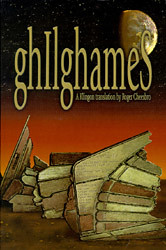Here’s the link: DaHjaj-Hol-110317
You can also subscribe via iTunes:
Advanced > Subscribe to Podcast > and enter the URL: http://bit.ly/tlh-pod
Hello, and welcome. You’re listening to DaHjaj Hol, your daily dose of Klingon language. I’m your host, Lawrence Schoen.
We’ve gotten to the point where we’ve talked about so many things it’s time to set you straight on how to talk about plurals. In Klingon, indicating whether or not a thing is singular or plural with a noun suffix is somewhat optional. Often, context will make the distinction clear. For example verb prefixes reveal something about the number of subjects and/or objects. Similarly, if an actual count is provided. However, when you do want to explicitly mark that a thing is plural, the class of Type 2 noun suffixes exist for just that purpose. There are three different plural suffixes, depending on what kind of noun you’re talking about.
Use –pu’ when the noun is something capable of using language. That’s P, U, Apostrophe. –pu’
Use –Du’ when the noun is a body part. Capital D, U, Apostrophe. –Du’
And finally, use –mey for all other things. M, E, Y –mey
We’ve already talked about –Du’ prior to today, but I should add that if you use –mey on a noun from either of the other two groupings (that is, language users or body parts), in addition to indicating the plural form, it also carries a connotation of “scattered about.”
novpu’ maS SoSlI’
your mother prefers aliens
romuluSngan ghIchDu’ wImaS
we hate Romulan noses
tugh tachmey Datu’nIS
you need to find taverns soon
betleHlIj narghlaHbe’ chom qoghmey
the bartender’s ears could not escape your bat’leth
(with the implication that the ears are scattered about)
People can, you know, use plurals or not. Now that you know how you might want to reflect on what is gained and what is lost by using or not leaving off the plural marking suffix. Sometimes the difference is gross, but sometimes quite subtle. Choosing to include the suffix can reveal something about how important that bit of grammatical information is to the speaker. For example, when I talk about language opening worlds, qo’mey poSmoH Hol, I’m stressing the multiplicity of the worlds, and saying nothing about how many languages I mean. Curious, isn’t it?
===
 |
Today’s podcast is brought to you by ghIghameS, translated by Roger Cheesbro. |
 |
Tags: Klingon
